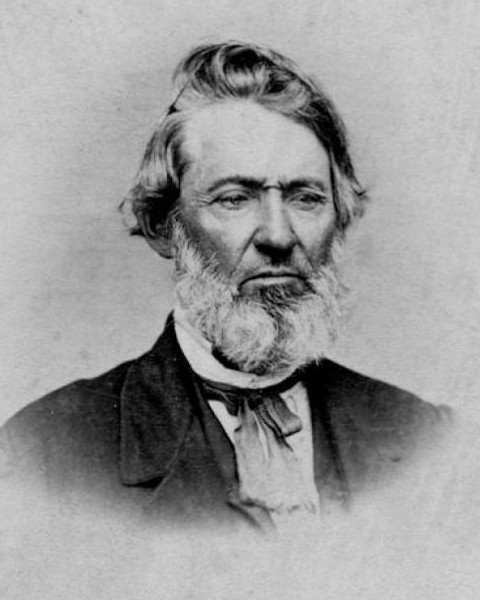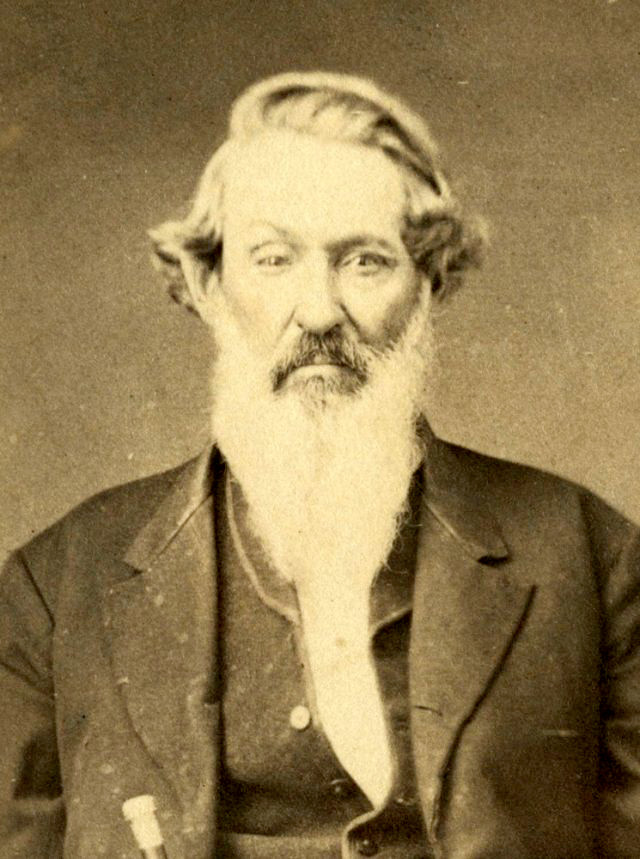William E. McLellin
(1806-1883)


Testimony of the Twelve Apostles; D&C 66; 68; 75:6–8; 90:35
By Susan Easton Black
In the summer of 1831, schoolteacher, physician, and Southerner William E. McLellin was introduced to the message of the Restoration. “Mr. [Harvey] Whitlock … expounded the Gospel the plainest I thot that I ever heard in my life,” William wrote. “D[avid] Whitmer then arose and bore testimony to having seen an Holy Angel who had made known the truth of this [Book of Mormon] record to him. [A]ll these strange things I pondered in my heart.”1
On August 20, 1831, twenty-five-year-old William McLellin was baptized in Jackson County, Missouri, by Hyrum Smith. He wrote on the day of his baptism, “From all the light that I could gain by examinations searches and researches I was bound as an honest man to acknowledge the truth and Validity of the book of Mormon and also that I had found the people of the Lord—The Living Church of Christ.”2 Four days after entering baptismal waters, William was ordained an elder by Hyrum Smith and Edward Partridge.
Wanting to meet the Prophet Joseph Smith, William journeyed to Kirtland, Ohio. He wrote of the prophet, “From my acquaintance then and until now I can truly say I believe him to be a man of God, a prophet, a seer and revelator to The Church of Christ.”3 While in Kirtland, William “went before the Lord in secret, and on my knees asked him to reveal the answer to five questions through his Prophet, and that too without his having any knowledge of my having made such request.”4
Feeling confident that he was not asking amiss, William asked Joseph Smith what the Lord’s will was concerning him. The revelation received by the prophet on October 25, 1831, commended and reproved the actions of William (see D&C 66:1–3). “I now testify in the fear of God,” William wrote, “that every question which I had thus lodged in the ears of the Lord of Sabbath, were answered to my full and entire satisfaction.”5 On the same date the revelation was received, William was ordained a high priest by Oliver Cowdery.
Yet one month later he didn’t hesitate to criticize the language of the revelations that Joseph Smith proposed to include in the Book of Commandments. Through the Prophet Joseph, the Lord challenged William to write his own revelations (see D&C 67:6–7). Joseph Smith later wrote, “William E. M’Lellin, as the wisest man, in his own estimation, having more learning than sense, endeavored to write a commandment like unto one of the least of the Lord’s, but failed.”6
In May 1832 William left Kirtland and returned to Jackson County. He served a short mission to Missouri and Illinois with Parley P. Pratt as his companion. After returning from the mission, he fled from threats of violence with fellow Latter-day Saints to Clay County, Missouri, in November 1833.
On February 15, 1835, William was called to the Quorum of the Twelve Apostles. His faithfulness in the quorum was short-lived. In 1835 William wrote a letter censuring the First Presidency and by 1836 had withdrawn his membership. Explaining the reasons for his actions, he wrote, “I left the church in Aug. 1836 … because the Leading men to a great extent left their religion and run into and after speculation, pride, and popularity! … I quit because I could not uphold the Presidency as men of God.”7 Yet on September 3, 1837, he was again sustained to the Quorum of the Twelve. But for his continuing unbelief and apostasy, William was excommunicated in 1838.
Rather than just walk away from the Church, William joined the mob element in Far West to plunder and pillage the homes of Latter-day Saints, forcing them to abandon their dwellings and flee out of the state of Missouri.
When Joseph Smith and other brethren were imprisoned in Richmond jail—
McLellin, who was a large and active man, went to the sheriff and asked for the privilege of flogging the Prophet. Permission was granted on condition that Joseph would fight. The sheriff made known to Joseph[,] McLellin’s earnest request, to which Joseph consented, if his irons were taken off. McLellin then refused to fight unless he could have a club, to which Joseph was perfectly willing, but the sheriff would not allow them to fight on such unequal terms.8
William never returned to Church fellowship. However, he associated with factions organized by George M. Hinkle, William Law, Sidney Rigdon, James J. Strang, David Whitmer, and Granville Hedrick. Through his various religious affiliations, a question arose about his testimony of the Book of Mormon. In 1880 he affirmed his testimony in a letter to J. T. Cobb:
I have set to my seal that the Book of Mormon is a true, divine record and it will require more evidence than I have ever seen to ever shake me relative to its purity. …
When a man goes at the Book of M. he touches the apple of my eye. He fights against truth—against purity—against light—against the purist, or one of the truest, purist books on earth. … Fight the wrongs of LD.S.ism as much as you please, but let that unique, that inimitable book alone.9
He advised Cobb to “cease your opposition and strife against the Book, … for you might just as well fight against the rocky mountains as the Book!!”10
By the last year of his life, William had broken away from all organized religion. He held the belief that the Lord would “establish the Church of Christ shortly, and then if they will accept me, I’ll unite with them!!!”11 William died on March 14, 1883, in Independence, Missouri, at age 77.
1. Jan Shipps and John W. Welch, ed., The Journals of William E. McLellin 1831–1836 (Provo, UT: BYU Studies, Brigham Young University, 1994), 29.
2. Shipps and Welch, The Journals of William E. McLellin, 33.
3. William E. McLellin letter to relatives, August 4, 1832, typescript, 2. Community of Christ Archives, Independence, MO.
4. Ensign of Liberty, January 1848, 61.
5. Ensign of Liberty, January 1848, 61.
6. Smith, History of the Church, 1:226.
7. Shipps and Welch, The Journals of William E. McLellin, 321.
8. Smith, History of the Church, 3:215n.
9. Larry C. Porter, “William E. McLellin’s Testimony of the Book of Mormon,” BYU Studies 10 (Summer 1970), 486.
10. Porter, “William E. McLellin’s Testimony of the Book of Mormon,” 486.
11. Porter, “William E. McLellin’s Testimony of the Book of Mormon,” 487.
